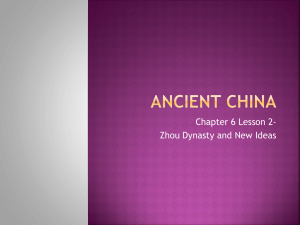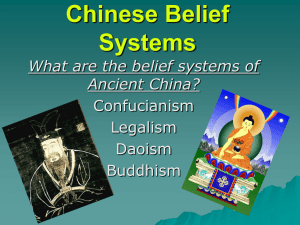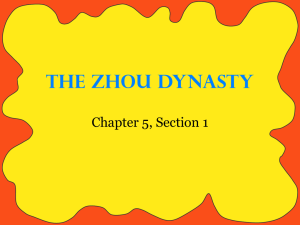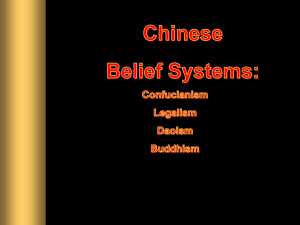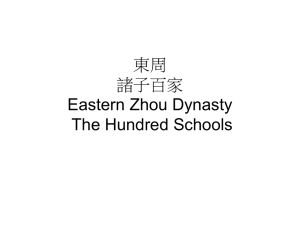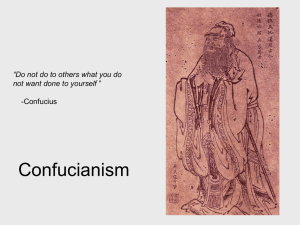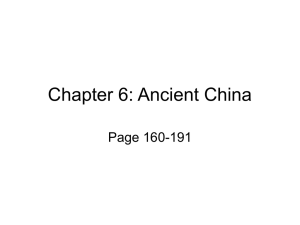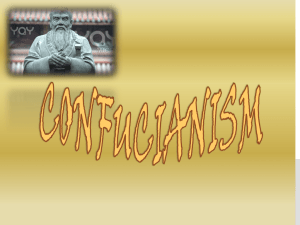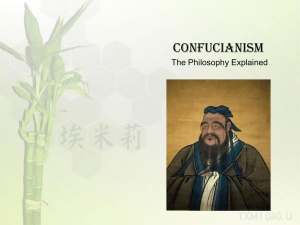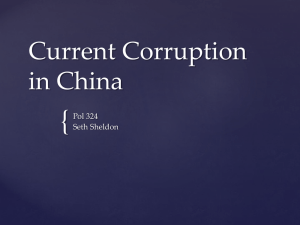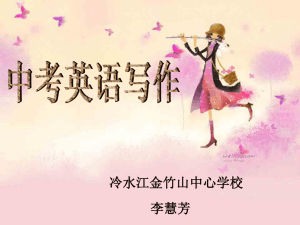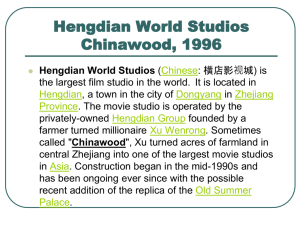Ancient China: The Zhou Dynasty - Confucianism & Daoism
advertisement
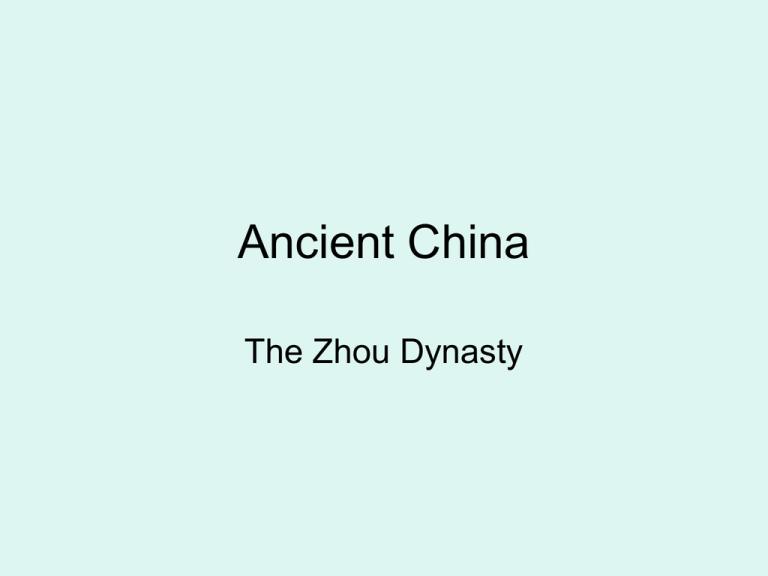
Ancient China The Zhou Dynasty The Zhou • In the 1100’s BC, the leaders of a people became known as the Zhou and ruled over China. They joined with nearby tribes and overthrew the Shang. The Zhou Dynasty lasted longer than any other in China. Zhou Political System • Zhou kings claimed to possess the Mandate of Heaven. This was seen as the god Heaven gave power to the king to rule. No one could rule without Heaven’s permission and if a ruler was found to be bad, he would lose Heaven’s support to another. The Zhou Political System • The Zhou came from the west. They used the mandate to justify their rebellion against the Shang. Later Zhou rulers will expand their land to the northwest and the east. Later they would move south the Chiang Jiang. A New Political Order • The Zhou established a new political order. They granted land to people in return for loyalty, military support and an array of services. In the social class, the king was at the top, lords (landowners) and lastly peasants. A New Social Order • The Zhou system brought order. Ruling through lords helped control distant areas and ensure loyalty to the king. In time this order would break down as lords handed over power to their sons who were not as loyal. As local leaders gained power, they would reject the power of the king. The Decline of Zhou Power • As loyalty to the king lessened, many refused to fight against invaders. In 771 BC, invaders reached the capital. Much like the story of the boy who cried wolf, the ruler was said to have lit warning fires to which soldiers would rush to defend. After several false calls, soldiers refused to come when invaders did show and the battle was lost. Decline of the Zhou • After this attack, the dynasty still survived. However, after this loss, lords started fighting each other. By 481 BC, China had entered the period known as the Warring States period. This was a time of brutal, civil war with soldiers cruelly fighting for land and not honor. Internal Problems • Family structure changes from large connected families that later will break apart and become rivals. Bonds of loyalty would weaken in smaller families – particularly among the upper classes. Warring States • To maintain peace, fathers would divide their lands amongst his sons. However, sons would just build wealth and then attack each other for control – some would even kill their fathers. Without a strong government, Chinese society will fall into a period of disorder. Confucius and Society • Thinkers spring up during the Zhou period formulating ideas on how to restore order. Confucius, or Master Kong, as he is known in western society, was one such thinker. Confucius • Confucius felt that China was filled with rude and dishonest people, and believed that the Chinese should return ethics and moral values. His ideas would become known as Confucianism. Confucianism – Family Order • Confucius wanted China to return to a time of when people knew their roles on society. • In the family … • Fathers should display high moral values for the family • Children should respect and obey their parents. • All family members should be loyal to each other. Confucianism - Government • Confucius’s ideas on government … • Moral leadership, not laws brought order to China. • A King should lead by example, inspiring good behavior in all his subjects. • The lower classes would learn by following the example of their superiors. Confucius – Teachings and Philosophy • Confucius gained a reputation as a respected teacher as he traveled. His ideas were passed down through his students and later his writings which were compiled in a book called the Analects. Philosophy • Since Confucianism focuses on morality, family, society and government, it can be viewed as a philosophy. However, it is also religious and has been a guiding force in human behavior and religious understanding in China for thousands of years. Confucius – Final Thought • Confucius believed that when people behaved well and acted morally, they were simply doing as heaven expected. Over the centuries, Confucius’s ideas would become the dominant beliefs in China. Daoism • Daoism takes its name from Dao, which means the way. It stressed living in harmony with the Dao, the guiding force of all reality. Daoist teachings say the Dao gave birth to the universe and all things in it. Daoism • It developed as a reaction to Confucianism. Daoists didn’t believe that active, involved leaders brought social harmony. They believed that government should stay out of the lives of the people. Daoists • Daoists believe that people should avoid interfering with nature or each other – they should just let things flow. The ideal ruler will rule effortlessly through the Dao and people will not know they are being governed. Daoists Teachings • Daoists believe that the universe is a balance of opposites, light and dark, low and high and that these opposite forces should be in harmony. While Confucianists focus on the human world, Daoists focus on the natural world. Daoists believe humans are just a part of nature, no better than other things. Laozi • Laozi was the most famous Daoist teachers. He taught that people should not seek wealth or power. He is credited with writing the basic text of Daoist teachings, The Way and Its Power. Legalism • Legalism is the thought that people are bad by nature and need to be controlled. • Unlike Daoism and Confucianism, there is no religious aspect, just a political philsophy. • Legalists believe that society needs strict laws to keep people in line and punishments should fit the crime. • Citizens should be responsible for others conduct and that a persons relatives and neighbors should be punished along with the offender. Legalism • Unity and efficiency are also important to Legalism. They wanted appointed officials to run China. They also wanted the empire to continue to grow so it should always be prepared for war. The Legalists will be the first to put their ideas into practice throughout China To Sum Up … • Exit: How did Doaists and Legalists differ on their ideas of government? • Stay tuned next time for The Qin Dynasty.
